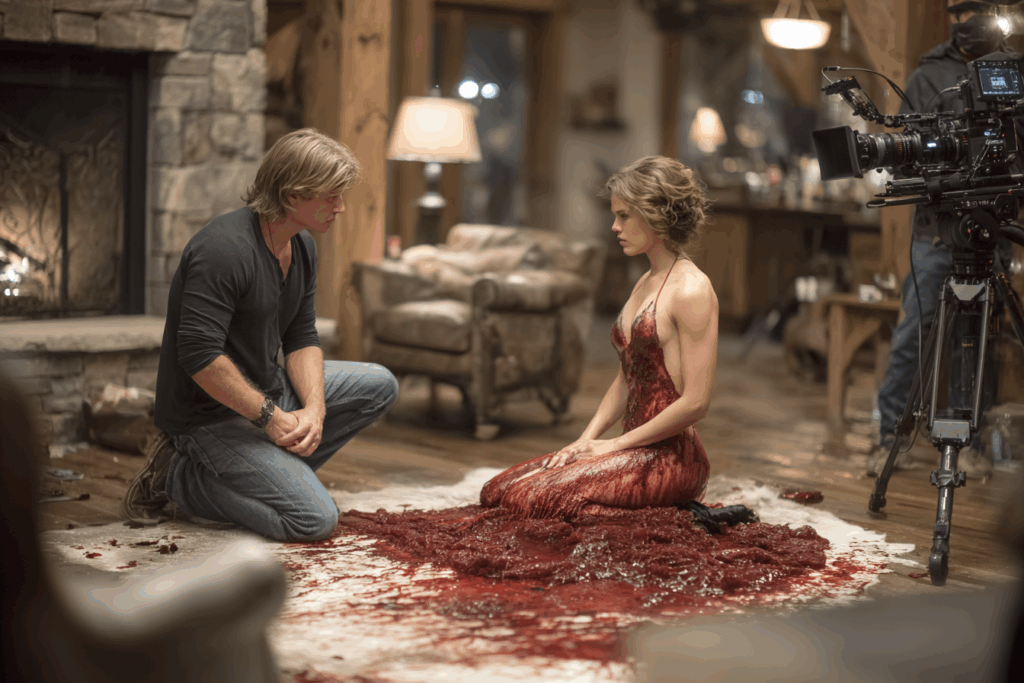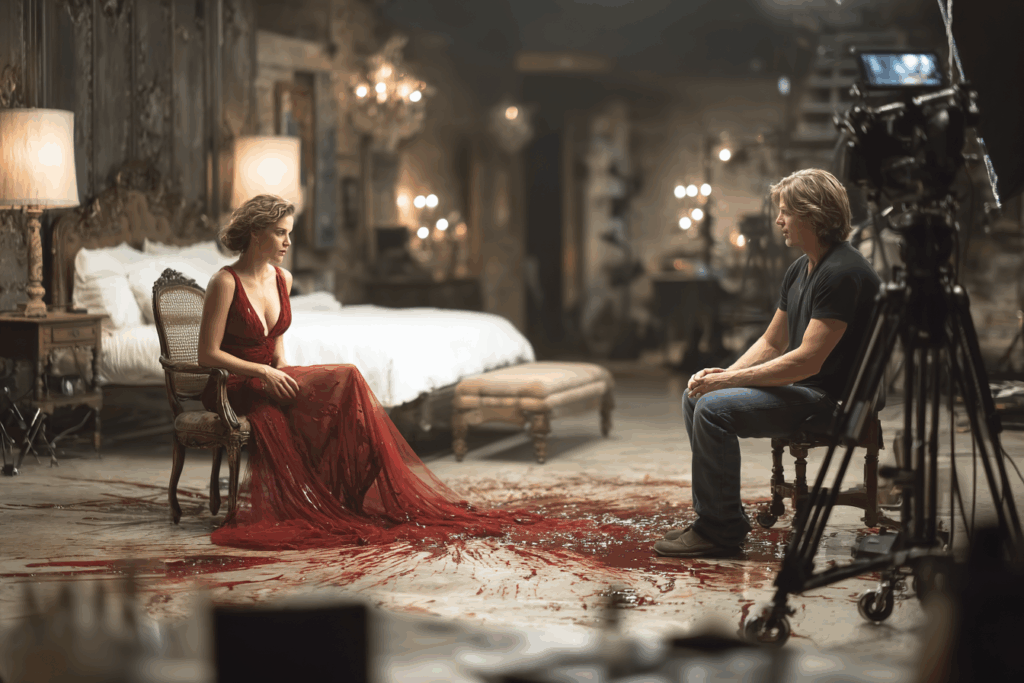How to Murder a Movie IV


Murder on the Hollywood Express
I’m standing in front of the Hollywood Express. The luxury train for the rich and famous. Exquisite interior design, a waiting list that’s months long, and Michelin-starred cuisine that rivals any top restaurant.
You say there’s no Hollywood Express? Not here? Not in Hollywood? Yes, there is. Tonight. And all the lost souls will embark on their final journey together.
I board the Hollywood Express. I go to the dining car. All the suspects have gathered there. Everyone has turned up. The atmosphere is tense.
Lady Jessica jumps up and complains in a shrill voice: “Inspector! I’ve been working in Hollywood for years and I’ve never heard of or seen a Hollywood Express. To me, this looks like a trap. Besides, the word ‘Express’ is spelled with three ‘s’ outside. As if someone was in a hurry or had a limited budget.”
“Very good, Lady Jessica, I admire your keen powers of observation. In fact, the train was built just for today’s episode. The train is a trap. A trap for the murderer.”
I give the conductor a signal, and the train slowly starts to move. Like glittering stars in the night, the lights of Los Angeles illuminate the black night.
The time has come. Everything is ready. My big moment!
I stand in front of the assembled group. Spotlights illuminate me perfectly from the front and back. The camera pans to me.
I begin in a dark, mysterious voice.
“Finally, after almost 40 minutes of airtime, it’s time for my closing monologue. I will now reveal your hidden motives, expose your lies, and name the true perpetrator of the murdered film.
But first, I would like to pay you a compliment. Yes, you all deserve a compliment. For what is probably the most exciting case in my television career.”
A dramatic pause.
“I admit, I was confused at first. Our stories usually have only three suspects. The obvious perpetrator, the suspect in the second act, and then the third, surprising perpetrator in the resolution. This case was different, I noticed that right away. There were too many suspects, too many clues, too many possibilities. One moment, please.”
I take the small mustache that Gillbert, our makeup artist, hands me and continue speaking with a slight French accent.
“There were also too many alibis. I checked your times carefully. Two of you were briefly in prison for tax evasion, one was in a rehab clinic, and one was on her honeymoon. You all have alibis. How do these pieces of the puzzle fit together?“
My French accent is getting stronger and stronger.
”I sat down in my favorite armchair with a hot chocolate and thought about it. After a few minutes, it was too exhausting, so I transferred all the data to the computer. It then found two solutions.”
The camera pans to Walter with his two gold-plated revolvers. “Now tell us your solution. This is pure torture!”
He looks at the cameraman. “Was that good?”
“Perfect,” replies the cameraman. “You can sit down again.”
“As you wish, Monsieur!” I say. “This is the first solution: there is no single perpetrator; no, several perpetrators worked together and gave each other false alibis.”
“That’s outrageous!” exclaims the king. “I wouldn’t ally myself with anyone. And none of the others would do that either. You’re wrong, Inspector!“
”Indeed, I was wrong,“ I agree. ”That’s not the right solution. The right solution is even more shocking. You are all the perpetrators, you all helped murder the film! You are all guilty!”
Pandemonium. Everyone jumps up, shouting, screaming, protesting their innocence. It takes a lot of effort to restore calm and order.
“You deny the crime? I will prove each and every one of you guilty!”

How to kill a movie – Sound
I point to the sound and music expert.
“You! Let’s start with you. Every filmmaker will confirm that sound and sound design account for up to 50% of the movie experience. But what did you do? You treated the sound and music as secondary. You didn’t make any effort. For you, the sound was just an unimportant component.
You, sir, you are a murderer. Your poor sound killed the movie.”
How to kill a movie – The big ego
I point my finger at the king.
“Now to you, Monsieur King. You are the producer and the director. You decide everything. But this power has changed you. You are supposed to support your employees and help them, but you rule over them. You only allow your own opinion, everything has to revolve around you. You don’t accept criticism or other opinions; the only thing that matters is yourself.
You have great power, but you also have a big ego. That big ego killed the film. You are a murderer! A royal murderer who is proud of his power and wears a golden crown!”
How to kill a movie – Spending, spending, spending
“Lady Jessica, you are certainly a good actress, but you are not suited to production. The film budget is not for you, but for the film. The first thing you think about is spending money. The crucial mistake: you think that if something is expensive, then it is also good. That’s how you shop. The most expensive camera, the most expensive props, the most expensive film production.
Then you’re surprised when the production runs out of money and there’s no money left for the important work to finish the film in good quality. Your excessive spending killed the film. It’s not about feeling good and important when we buy expensive items. Only things that are necessary for the film should be bought. That makes you, Lady Jessica, a murderer too.”
How to kill a movie – Creativity not Money
“But you made the biggest mistake of all, Walter! Producing movies means solving problems. Every day brings new problems. How do good film productions solve problems? By finding creative solutions. Creativity creates new solutions; creativity is what makes a movie special. But you, you cover up all the problems with money. In doing so, you are doing massive damage to the movie. You destroy the film budget and don’t allow any creativity.
You think money solves problems. The truth is, creativity solves problems.
Simply throwing money at the problem leads to ruin.
It could have been a good film, but the budget was used up and so this cruel film murder took place. You are a murderer, Walter! You can tell me that you only wanted the best. But that doesn’t absolve you of your guilt.“
How to kill a movie – Screenplay, what Screenplay?
”I haven’t forgotten you, Monsieur Author. I know you’re just an employee and did what you were told, but you’re also partly to blame. The screenplay is the foundation of a successful film. Writing something quickly every day won’t work. If there are already 14 versions of the screenplay, it’s still your job to write the 15th version. And then the 16th version, and so on.
Too many film productions are willing to spend millions on stars and special effects, but they cut corners on the screenplay. On the actual theme, the story, the motivation of the characters. Any production that skimps on the script and is not willing to work on it is guilty if the film later becomes a problem. This film murder begins on the first page of the script. You, too, sir, are guilty of this.”
How to kill a movie – One Shot
I turn to the man in the immaculate white suit.
“Since we’re listing the guilty parties, you are also guilty of murder. You were never really interested in the film. You were only interested in the finances. The only thing that mattered to you was that everything happened quickly. Why invest in a good script, sufficient rehearsal time, and enough time for filming to create a really good movie?
All of that takes far too long for you. Too many little things, too many small, unimportant decisions. You should have given the production much more time to really develop the story. You demanded that everyone get everything right on the first try. But without practice and training, you’ll never develop a good golf swing, and of course, you’ll never make a good movie.
Sufficient time for preparation and sufficient shooting time are the most important factors for an outstanding film.”

How to kill a movie – marketing, maybe
At that moment, we are interrupted. A man in colorful clothes has entered the compartment and is trying to sit down inconspicuously with the group.
“Who are you? And why are you only coming in now, at the end of the episode?”
“I’m the marketing man,” he says confidently. “This is my big moment. The film is almost over. This is the perfect time to start marketing. I’ll start with a brainstorming session, then hire a few designers and start designing a marketing campaign. Is there any budget left? Otherwise, I can only offer a few quickly printed posters and a trailer that explains the whole film. With lots of loud music and two or three mysterious sentences. The usual.”
He looks around with satisfaction.
“I’ve been waiting for you,” I say. “Yes, you. The worst killer of them all! Marketing! We live in a world where thousands of products compete for our attention every day. To successfully promote a film, you need time, money, and a really good plan. Marketing for a film must begin before the film is shot. Marketing is not something that happens on the side, with whatever money is left in the budget. Marketing is the central task for every production.
Shall I shock you? Yes? Then listen to this: Marketing is just as important as the film itself. Marketing determines whether the public even hears about a new film. Marketing is the first step in successfully selling the film later on.
If you’re not willing to invest in advertising, you shouldn’t even try to produce a film.“
I look the marketing man in the face.
”You, sir. You are a murderer. You are complicit in the murder of this film, which now no one in the whole world will see. What a cruel murder!”
After a short pause, I continue my monologue.
“Mesdames et Messieurs, you tried to fool good old Poiro… I mean, good old Garrett, but you didn’t succeed. I solved the case, I found the murderer. The murderers! All of you!”
I take a sip of the hot chocolate my butler hands me and then stroke my Belgian mustache with satisfaction.

Sequels, musicals, and Broadway
Lady Jessica struggles to her feet. Her self-confidence is shattered, her fame as a star gone.
“Inspector Garrett,” she says in a weak voice, “what will become of us now?”
(Dramatic music, a film cut.)
Completely out of the blue, the chief storms onto the set of Hollywood Express.
“Great! Wonderful!” he exclaims. “What a story! What a case! I thank you all. Lady Jessica, Inspector Garrett, bravo, bravo!
I’ll tell you what we’re going to do. First, we’ll rework this episode and then release it as a movie. The name of the movie will be: How to Murder Your Movie.
And then we’ll really get started! We’re here in Hollywood. I’m just saying, a sequel, a musical version, and next year we’ll bring the story to Broadway as a play.“
He points to the author.
”And you will write the scripts and the play. Lady Jessica will reprise the same role, and we will negotiate with you for all other positions in the coming months.
We’ll also publish a book for film students: How to Murder Your Movie!
It’s going to be wonderful.”
The chief hugs me, the actors applaud.
What an ending!

Now it’s your turn
Yes, this is Hollywood, a place where your dreams come true. At least, if someone gives you enough money to make your dreams into a movie.
That’s all. And now get started! It’s time to continue working on your own dream movie. Your wonderful new movie.
But be careful!
Don’t commit murder! Don’t kill your movie!
Otherwise, I’ll visit your set and arrest you.
Wishing you all the best for your movie,
Inspector Garrett.
Movie Murder Department, Hollywood
